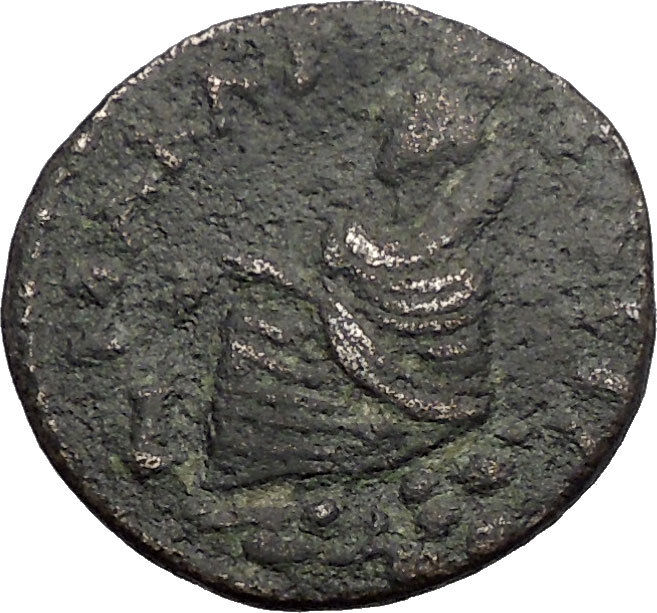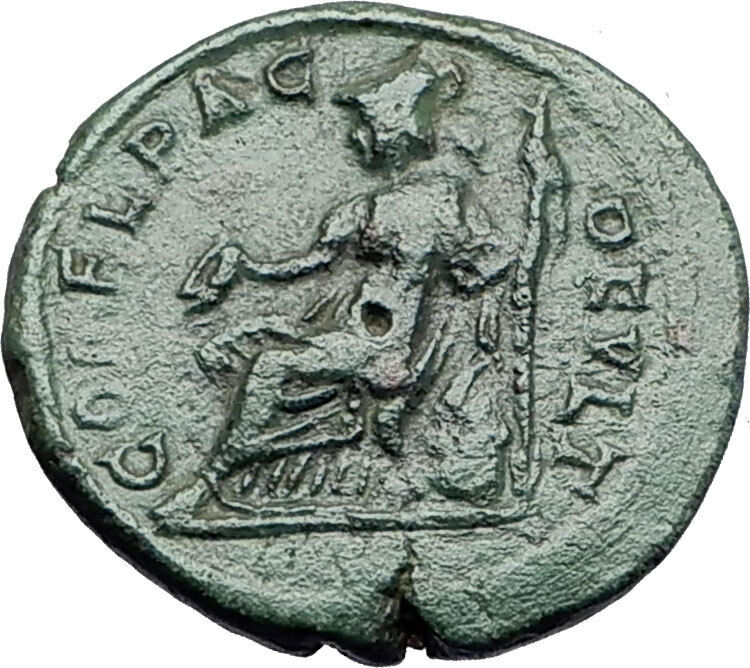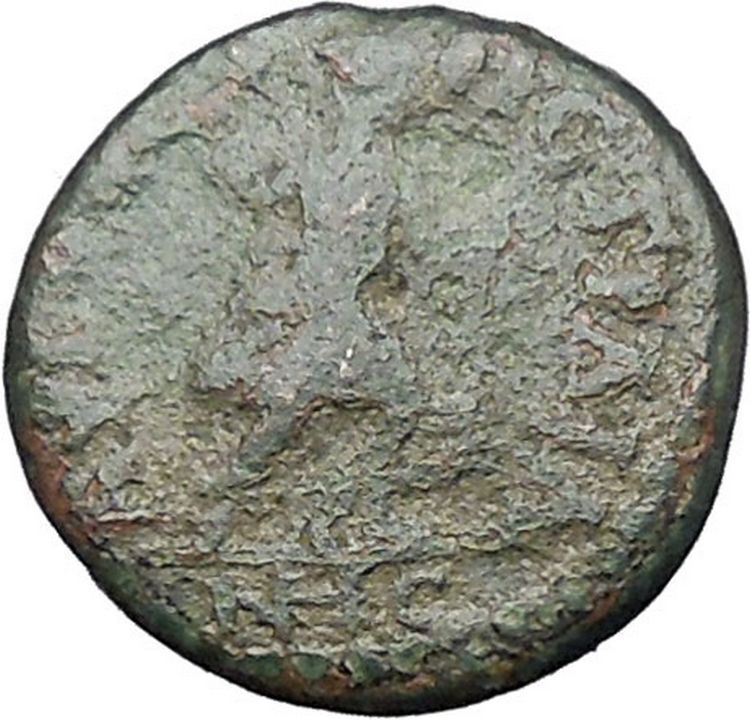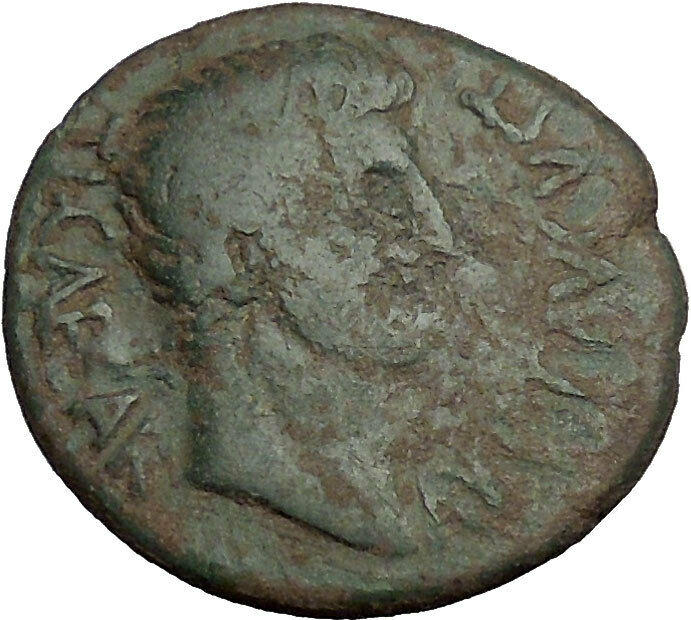|
Germanicus and Drusus, Roman Caesars
Bronze 27mm (15.32 grams) of Sardes in Lydia
Original Strike, circa 23-26 A.D. and restruck circa 28-29 AD, by Asinius Pollio, Proconsul
Reference: Sardis -; RPC I 2995; BMC Lydia pg. 252, 106; SNG Copenhagen 518
* NOT CERTIFIED by NGC because “TOOLED”
ΔΡΟΥΣΟΣ ΚΑΙ ΓΕΡΜΑΝΙΚΟΣ ΚΑΙΣΑΡΕΣ ΝΕΟΙ ΘΕΟΙ ΦΙΛΑΔΕΛΦΟΙ, Drusus and Germanicus seated left in curule chairs.
ΚΟΙΝΟΥ / ΑΣΙΑΣ in wreath; ΓΑΙΩ ΑΣΙΝΝΙΩ ΠΟΛΛΙΩΝΙ ΑΝΘΥΠΑΤΩ around (overstruck on original legend).
* Numismatic Note: This interesting coin appears to be an original issue, but in actuality, it is an earlier issue that is restruck with two intricate ‘countermarks.’ These ‘countermarks’ were ring-shaped punch restrikings of the legends that surround the obverse and reverse designs. While the obverse ‘countermark-legend’ is the same as that which appeared on the original striking, the reverse legend, originally ΕΠΙ ΑΡΧΙΕΡΕΩΣ ΑΛΕΞΑΝΔΡΟΥ ΚΛΕΩΝΟΣ ΣΑΡΔΙΑΝΟΥ, has been totally replaced by a new ‘countermark-legend.’
This issue has also been given to Pergamum, Ephesus, and Smyrna, as Sardis is only referred to on the coins as the city from which the high priest hails. However, as the authors of RPC point out, six specimens were recorded in excavations at Sardis (T.V. Buttrey, et al., Greek, Roman, and Islamic Coins from Sardis [Cambridge, MA: Harvard University Press, 1982], p. 50, 274. Without a proper ethnic proclaiming the authority, they may be better thought of as Koinon issues.
* Note regarding “NOT CERTIFIED by NGC” coins. Certain coins are ineligible types for NGC slabbing because of their very strict grading policy as their experts sometimes uncover things that make them ineligible for their grading service and list this reason. A lot of, or possibly even most collectors could consider the reasons minor or insignificant to the enjoyment of the history, collectibility and beauty of the coin. In the interest of honesty and integrity, this information is disclosed to you so that you can make an informed decision of exactly what you getting.
You are bidding on the exact item pictured, provided with a Certificate of Authenticity and Lifetime Guarantee of Authenticity.
_01.jpg/200px-Drusus_minor_(Museo_del_Prado)_01.jpg) Nero Claudius Drusus, later Drusus Julius Caesar (his adoptive name) (13 BC-September 14, 23), was the only child of Roman Emperor Tiberius and his first wife, Vipsania Agrippina. He was born in 7 October 15 BC or 14 BC with the name Nero Claudius Drusus, and is also known to historians as Drusus II and Drusus Minor. Drusus was named after his paternal uncle the general Nero Claudius Drusus (who is sometimes called Nero Drusus, Drusus I, Drusus Major, or Drusus the Elder), who was Tiberius’ younger brother. He was born and raised in Rome. Drusus was the first grandchild of statesman Marcus Vipsanius Agrippa and his first wife Caecilia Attica. Nero Claudius Drusus, later Drusus Julius Caesar (his adoptive name) (13 BC-September 14, 23), was the only child of Roman Emperor Tiberius and his first wife, Vipsania Agrippina. He was born in 7 October 15 BC or 14 BC with the name Nero Claudius Drusus, and is also known to historians as Drusus II and Drusus Minor. Drusus was named after his paternal uncle the general Nero Claudius Drusus (who is sometimes called Nero Drusus, Drusus I, Drusus Major, or Drusus the Elder), who was Tiberius’ younger brother. He was born and raised in Rome. Drusus was the first grandchild of statesman Marcus Vipsanius Agrippa and his first wife Caecilia Attica.
Despite his violent temper, Drusus showed promise with both military and politics. In 13, he was made a permanent member of the Senate committee Augustus had founded to draw up the Senate’s daily business. However, because Drusus was only related to the Claudian side of the family, rather than both the Julians and Claudians, Augustus forced Tiberius to adopt Germanicus, who was married to Augustus’s granddaughter, as his son and heir, removing Drusus from the succession. In 14, after the death of Augustus, Drusus suppressed a mutiny in Pannonia. In 15 he became a consul. He was also governor of Illyricum from 17 to 20. In 21 he was consul again, significantly with his father Tiberius as his colleague, while in 22 he received tribunicia potestas (tribunician power), a distinction reserved solely for the emperor or his immediate successor.
Drusus married his paternal cousin Livilla in 4. Their daughter Julia was born shortly after. They had twin sons Tiberius Gemellus and Tiberius Claudius Caesar Germanicus II Gemellus in 19, the latter of whom died still an infant in 23. In the same year, Germanicus died, making Drusus the new heir; Germanicus’ wife Agrippina suspected Tiberius of having killed him to allow Drusus to become his heir, but this is unlikely.
Before the birth of the twins, Livilla may already have been in a relationship with Sejanus, Tiberius’ Praetorian Prefect. Moreover Drusus, who was naturally irascible, had once in the course of a casual argument with Sejanus raised his fist and struck him in the face. By 23 it looked as if Drusus, who made no secret of his antipathy towards Sejanus, would succeed Tiberius as emperor. For reasons of self-survival, but also because he may have had designs on the supreme power, Sejanus needed to remove Drusus. Ancient sources (Tacitus, Suetonius, Cassius Dio) concur that with Livilla as his accomplice he poisoned her husband. If Drusus was indeed murdered, then it was done so skillfully that his death in 23 gave rise to no suspicion, having as he did a reputation for heavy drinking. Sejanus then (25) asked for Livilla’s hand in marriage but Tiberius forbade it.
Sejanus fell in 31 (October 18). A few days later (October 26) Sejanus’ former wife Apicata committed suicide, but not before addressing a letter to Tiberius claiming that Drusus had been poisoned, with the complicity of Livilla. Drusus’ cupbearer Lygdus and Livilla’s physician Eudemus were now tortured, and seemed to confirm Apicata’s accusation. By the end of the year Livilla too had perished, supposedly forcibly starved to death by her own mother, Antonia.
Drusus was an avid enthusiast of gladiator fights. In fact, we hear that the sharpest swords were named “Drusian” after him. Drusus is noted to have once come to blows with Sejanus in an argument. An earlier fight with a praetorian guard (possibly Sejanus as well) earned him the ironic nickname “Castor”, after the patron god of the praetorians. He features under this name in the novel I, Claudius by Robert Graves, and in its BBC adaptation (in which he was played by Kevin McNally).
He is associated with the gourmand Apicius. Under Apicius’ influence he disdained a certain vegetable of the cabbage family, earning a reprimand from Tiberius. Drusus is also recorded as using bitter almonds (five or six at a time) as a prophylactic against drunkenness.
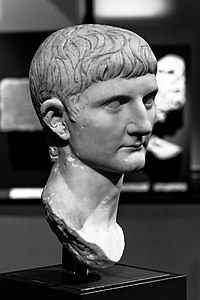 Germanicus Julius Caesar (24 May 16 B.C. or 15 B.C. �” 10 October A.D. 19), commonly known as Germanicus, was a member of the Julio-Claudian dynasty and a prominent general of the early Roman Empire. He was born in Lugdunum, Gaul, and was named either Nero Claudius Drusus after his father or Tiberius Claudius Nero after his uncle. He received the agnomen Germanicus in 9 BC, when it was posthumously awarded to his father in honour of his victories in Germania. Germanicus Julius Caesar (24 May 16 B.C. or 15 B.C. �” 10 October A.D. 19), commonly known as Germanicus, was a member of the Julio-Claudian dynasty and a prominent general of the early Roman Empire. He was born in Lugdunum, Gaul, and was named either Nero Claudius Drusus after his father or Tiberius Claudius Nero after his uncle. He received the agnomen Germanicus in 9 BC, when it was posthumously awarded to his father in honour of his victories in Germania.
Germanicus was the grandson-in-law and great-nephew of the Emperor Augustus, nephew and adoptive son of the Emperor Tiberius, father of the Emperor Caligula, brother of the Emperor Claudius, and the maternal grandfather of the Emperor Nero.
Family and early life
Germanicus was raised and educated in Rome. His parents were the general Nero Claudius Drusus (son of Empress Livia Drusilla, third wife of Emperor Augustus) and Antonia Minor (the younger daughter of the triumvir Mark Antony and Octavia Minor, sister of Augustus). Livilla was his sister and the future Emperor Claudius was his younger brother.
Germanicus married his maternal second cousin Agrippina the Elder, a granddaughter of Augustus, between 5 and 1 BC. The couple had nine children. Two died very young; another, Gaius Julius Caesar, died in early childhood. The remaining six were: Nero Caesar, Drusus Caesar, the Emperor Caligula, the Empress Agrippina the Younger, Julia Drusilla, and Julia Livilla. Through Agrippina the Younger, Germanicus was the Emperor Nero’s maternal grandfather.
Germanicus became immensely popular among the citizens of Rome, who enthusiastically celebrated his military victories. He was also a favourite with Augustus, his great-uncle, who for some time considered him heir to the Empire. In AD 4, persuaded by Livia, his wife, Augustus decided in favour of Tiberius, his stepson from Livia’s first marriage to Tiberius Nero. However, Augustus compelled Tiberius to adopt Germanicus as a son and to name him as his heir (see Tacitus, Annals IV.57). Upon this adoption, Germanicus’s name was changed to Germanicus Julius Caesar. He also became the adoptive brother of Tiberius’s natural son Drusus the Younger.
Germanicus held several military commands, leading the army in the campaigns in Pannonia and Dalmatia. He is recorded to have been an excellent soldier and an inspired leader, loved by the legions. In the year 12 he was appointed consul after five mandates as quaestor.
Commander of Germania
After the death of Augustus in 14, the Senate appointed Germanicus commander of the forces in Germania. A short time after, the legions rioted on the news that their recruitments would not be marked back down to 16 years from the now standard 20. Refusing to accept this, the rebel soldiers cried for Germanicus as emperor. Germanicus put down this rebellion himself, to honour Augustus’ choice and stamp out the mutiny, preferring to continue only as a general. In a bid to secure the loyalty of his troops and his own popularity with them and with the Roman people, he led them on a spectacular but brutal raid against the Marsi, a German tribe on the upper Ruhr river, in which he massacred much of the tribe.
During each of the next two years, he led his 8-legion army into Germany against the coalition of tribes led by Arminius, which had successfully overthrown Roman rule in a rebellion in 9. His major success was the capture of Arminius’ wife Thusnelda in May 15. He let Arminius’ wife sleep in his quarters during the whole of the time she was a prisoner. He said, “They are women and they must be respected, for they will be citizens of Rome soon”[citation needed]. He was able to devastate large areas and eliminate any form of active resistance, but the majority of the Germans fled at the sight of the Roman army into remote forests. The raids were considered a success since the major goal of destroying any rebel alliance networks was completed.
After visiting the site of the disastrous Battle of the Teutoburg Forest, where 20,000 Romans had been killed in 9 CE, and burying their remains, he launched a massive assault on the heartland of Arminius’ tribe, the Cheruscans. Arminius initially lured Germanicus’ cavalry into a trap and inflicted minor casualties, until successful fighting by the Roman infantry caused the Germans to break and flee into the forest. This victory, combined with the fact that winter was fast approaching, meant Germanicus’s next step was to lead his army back to its winter quarters on the Rhine.
In spite of doubts on the part of his uncle, Emperor Tiberius, Germanicus managed to raise another huge army and invaded Germany again the next year, in 16. He forced a crossing of the Weser near modern Minden, suffering heavy losses, and then met Arminius’ army at Idistoviso, further up the Weser, near modern Rinteln, in an engagement often called the Battle of the Weser River. Germanicus’s leadership and command qualities were shown in full at the battle as his superior tactics and better trained and equipped legions inflicted huge casualties on the German army with only minor losses. One final battle was fought at the Angivarian Wall west of modern Hanover, repeating the pattern of high German fatalities forcing them to flee. With his main objectives reached and with winter approaching Germanicus ordered his army back to their winter camps, with the fleet occasioning some damage by a storm in the North Sea. Although only a small number of soldiers died it was still a bad ending for a brilliantly fought campaign. After a few more raids across the Rhine, which resulted in the recovery of two of the three legion’s eagles lost in 9, Germanicus was recalled to Rome and informed by Tiberius that he would be given a triumph and reassigned to a different command.
Despite the successes enjoyed by his troops, Germanicus’ German campaign was in reaction to the mutinous intentions of his troops, and lacked any strategic value. In addition he engaged the very German leader (Arminius) who had destroyed three Roman legions in 9, and exposed his troops to the remains of those dead Romans. Furthermore, in leading his troops across the Rhine, without recourse to Tiberius, he contradicted the advice of Augustus to keep that river as the boundary of the empire, and opened himself to doubts about his motives in such independent action. These errors in strategic and political judgement gave Tiberius reason enough to recall his nephew.
Command in Asia and death
Germanicus was then sent to Asia, where in 18 he defeated the kingdoms of Cappadocia and Commagene, turning them into Roman provinces. During a sightseeing trip to Egypt (not a regular province, but the personal property of the Emperor) he seems to have unwittingly usurped several imperial prerogatives.[2] The following year he found that the governor of Syria, Gnaeus Calpurnius Piso, had canceled the provincial arrangements that he had made. Germanicus in turn ordered Piso’s recall to Rome, although this action was probably beyond his authority.[2] In the midst of this feud Germanicus died suddenly in Antioch. His death aroused much speculation, with several sources blaming Piso, under orders from Emperor Tiberius. This was never proven, and Piso later died while facing trial (ostensibly by suicide, but Tacitus supposes Tiberius may have had him murdered before he could implicate the emperor in Germanicus’ death), because he feared the people of Rome knew of the conspiracy against Germanicus, but Tiberius’ jealousy and fear of his nephew’s popularity and increasing power was the true motive.
The death of Germanicus in what can only be described as dubious circumstances greatly affected Tiberius’ popularity in Rome, leading to the creation of a climate of fear in Rome itself. Also suspected of connivance in his death was Tiberius’ chief advisor, Sejanus, who would, in the 20s, turn the empire into a frightful tyranny.
Posthumous honors
Germanicus’ death brought much public grief in Rome and throughout the Roman Empire. His death was announced in Rome during December of 19. There was public mourning during the festive days in December. The historians Tacitus and Suetonius record the funeral and posthumous honors of Germanicus. At his funeral, there were no procession statues of Germanicus. There were abundant eulogies and reminders of his fine character.
His posthumous honors included his name was placed into the following: the Carmen Saliare; the Curule chairs; placed as an honorary seat of the Brotherhood of Augustus and his coffin was crowned by oak-wreaths. Other honors include his ivory statue as head of procession of the Circus Games; his posts of priest of Augustus and Augur were to be filled by members of the imperial family; knights of Rome gave his name to a block of seats to a theatre in Rome.
Arches were raised to him throughout the Roman Empire in particularly, arches that recorded his deeds and death at Rome, Rhine River and Nur Mountains. In Antioch, where he was cremated had a sepulchre and funeral monument dedicated to him.
On the day of Germanicus’ death his sister Livilla gave birth to twins. The second, named Germanicus, died young. In 37, when Germanicus’ only remaining son, Caligula, became emperor, he renamed September Germanicus in honor of his father. Many Romans considered him as their equivalent to King Alexander the Great. Germanicus grandson was Emperor Nero Caesar-died 68 AD-the last of the Julio-Claudian dynasty.
|







_01.jpg/200px-Drusus_minor_(Museo_del_Prado)_01.jpg) Nero Claudius Drusus, later Drusus Julius Caesar (his adoptive name) (13 BC-September 14, 23), was the only child of Roman Emperor Tiberius and his first wife, Vipsania Agrippina. He was born in 7 October 15 BC or 14 BC with the name Nero Claudius Drusus, and is also known to historians as Drusus II and Drusus Minor. Drusus was named after his paternal uncle the general Nero Claudius Drusus (who is sometimes called Nero Drusus, Drusus I, Drusus Major, or Drusus the Elder), who was Tiberius’ younger brother. He was born and raised in Rome. Drusus was the first grandchild of statesman Marcus Vipsanius Agrippa and his first wife Caecilia Attica.
Nero Claudius Drusus, later Drusus Julius Caesar (his adoptive name) (13 BC-September 14, 23), was the only child of Roman Emperor Tiberius and his first wife, Vipsania Agrippina. He was born in 7 October 15 BC or 14 BC with the name Nero Claudius Drusus, and is also known to historians as Drusus II and Drusus Minor. Drusus was named after his paternal uncle the general Nero Claudius Drusus (who is sometimes called Nero Drusus, Drusus I, Drusus Major, or Drusus the Elder), who was Tiberius’ younger brother. He was born and raised in Rome. Drusus was the first grandchild of statesman Marcus Vipsanius Agrippa and his first wife Caecilia Attica. Germanicus Julius Caesar (24 May 16 B.C. or 15 B.C. �” 10 October A.D. 19), commonly known as Germanicus, was a member of the Julio-Claudian dynasty and a prominent general of the early Roman Empire. He was born in Lugdunum, Gaul, and was named either Nero Claudius Drusus after his father or Tiberius Claudius Nero after his uncle. He received the agnomen Germanicus in 9 BC, when it was posthumously awarded to his father in honour of his victories in Germania.
Germanicus Julius Caesar (24 May 16 B.C. or 15 B.C. �” 10 October A.D. 19), commonly known as Germanicus, was a member of the Julio-Claudian dynasty and a prominent general of the early Roman Empire. He was born in Lugdunum, Gaul, and was named either Nero Claudius Drusus after his father or Tiberius Claudius Nero after his uncle. He received the agnomen Germanicus in 9 BC, when it was posthumously awarded to his father in honour of his victories in Germania.

